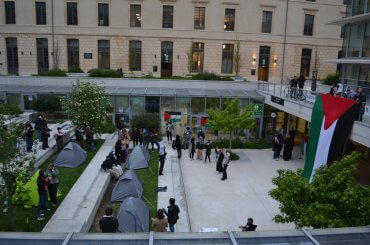In response to the youth of the Gaza Strip and the West Bank rising up on March 14 and 15 to call for Palestinian political unity, both the leaders of Fatah and Hamas pledged to enter into talks aimed at reconciliation. Most recently, President Mahmoud Abbas of Fatah “met with senior Hamas officials to discuss a proposed trip to Gaza and efforts to mend internal Palestinian division by forming a unity government,” the Ma’an News Agency reported.
With those talks came a spate of articles in the U.S. corporate media about the efforts at reconciliation. But in providing background on why these talks are happening, and the roots of the split between Hamas and Fatah, media outlets have deleted the crucial role the U.S. played in fomenting that split.
The New York Times explained that:
[Abbas had] not set foot in Gaza in the four years since a brief, bloody civil war there sent him and his Fatah colleagues fleeing to the West Bank…Hamas won Palestinian legislative elections in early 2006, and, for a brief time, Fatah and Hamas had a national unity government. But tensions between them led to the fighting and a break in communications.
TIME magazine’s Karl Vick similarly put it this way:
Mahmoud Abbas, who heads the Fatah party that governs the West Bank, has accepted an invitation from rival Hamas to travel to the Gaza Strip. The visit would be the first since Hamas drove Fatah operatives out of Gaza in 2007 — throwing some off from the tops of buildings — in the turmoil that followed Hamas’ surprise victory in elections months earlier.
All of these accounts don’t mention where the “turmoil” and the breakup of the short-lived national unity government between Hamas and Fatah following the 2006 elections came from. The 2008 expose of the Bush administration’s role in the split by David Rose in Vanity Fair remains essential reading for those wanting to understand the roots of the split.
Some crucial excerpts:
Vanity Fair has obtained confidential documents, since corroborated by sources in the U.S. and Palestine, which lay bare a covert initiative, approved by Bush and implemented by Secretary of State Condoleezza Rice and Deputy National Security Adviser Elliott Abrams, to provoke a Palestinian civil war. The plan was for forces led by Dahlan, and armed with new weapons supplied at America’s behest, to give Fatah the muscle it needed to remove the democratically elected Hamas-led government from power. (The State Department declined to comment.)
But the secret plan backfired, resulting in a further setback for American foreign policy under Bush. Instead of driving its enemies out of power, the U.S.-backed Fatah fighters inadvertently provoked Hamas to seize total control of Gaza…
Within the Bush administration, the Palestinian policy set off a furious debate. One of its critics is David Wurmser, the avowed neoconservative, who resigned as Vice President Dick Cheney’s chief Middle East adviser in July 2007, a month after the Gaza coup.
Wurmser accuses the Bush administration of “engaging in a dirty war in an effort to provide a corrupt dictatorship [led by Abbas] with victory.” He believes that Hamas had no intention of taking Gaza until Fatah forced its hand. “It looks to me that what happened wasn’t so much a coup by Hamas but an attempted coup by Fatah that was pre-empted before it could happen,” Wurmser says…
Without this back story, why there is a bitter Hamas-Fatah split remains obscured. The least the U.S. media could do is provide a sentence explaining these facts.
Alex Kane blogs on Israel/Palestine and Islamophobia in the U.S. at alexbkane.wordpress.com, where this post originally appeared. Follow him on Twitter @alexbkane.

